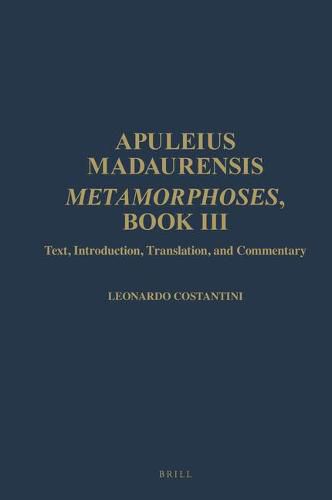Readings Newsletter
Become a Readings Member to make your shopping experience even easier.
Sign in or sign up for free!
You’re not far away from qualifying for FREE standard shipping within Australia
You’ve qualified for FREE standard shipping within Australia
The cart is loading…






Adventure, sex, magic, robbery, and dramatic declamatory displays play a central role in the plot of Apuleius’ Metamorphoses III. This volume completes the prestigious Groningen Commentaries on Apuleius series, which is available in its entirety as a digital resource as well: Apuleius Online. This volume on book III presents a new text of Metamorphoses III provided with an English translation and a full commentary, which covers literary, linguistic, textual, narratological, and socio-cultural matters. The introduction casts new light on many aspects of Apuleius’ novel, including its relationship with its lost Greek model, with the Greek love novels and with other genres (epic, poetry, declamation), Apuleius’ elaborate style, the narratological features of book III and its main themes. An appendix is devoted to the manuscript transmission of the Metamorphoses: it factors in new textual evidence gathered from the first examination of several recentiores since Oudendorp (1786) and Hildebrand (1842).
$9.00 standard shipping within Australia
FREE standard shipping within Australia for orders over $100.00
Express & International shipping calculated at checkout
Stock availability can be subject to change without notice. We recommend calling the shop or contacting our online team to check availability of low stock items. Please see our Shopping Online page for more details.
Adventure, sex, magic, robbery, and dramatic declamatory displays play a central role in the plot of Apuleius’ Metamorphoses III. This volume completes the prestigious Groningen Commentaries on Apuleius series, which is available in its entirety as a digital resource as well: Apuleius Online. This volume on book III presents a new text of Metamorphoses III provided with an English translation and a full commentary, which covers literary, linguistic, textual, narratological, and socio-cultural matters. The introduction casts new light on many aspects of Apuleius’ novel, including its relationship with its lost Greek model, with the Greek love novels and with other genres (epic, poetry, declamation), Apuleius’ elaborate style, the narratological features of book III and its main themes. An appendix is devoted to the manuscript transmission of the Metamorphoses: it factors in new textual evidence gathered from the first examination of several recentiores since Oudendorp (1786) and Hildebrand (1842).